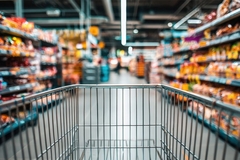
- Industry news
Industry news
- Category news
Category news
- Reports
- Key trends
- Multimedia
- Journal
- Events
- Suppliers
- Home
- Industry news
Industry news
- Category news
Category news
- Reports
- Key trends
- Multimedia
- Events
- Suppliers
Peruvian Anchovy Producers Pursuing MSC Certification

The fish oil Ocean Nutrition Canada uses to make its MEG-3-branded dietary supplement and healthy food ingredients is a by-product of the Peruvian fishmeal industry, meaning ONC makes use of a product considered a waste product in another industry.

23 Jul 2009 These days, consumers aren’t just shopping, they’re “voting” with their purchase dollars, buying products that are local, recycled, or from sustainable sources. This trend towards conscious consumerism is literally changing the world: If given the choice between products from unregulated sources and products from certified sustainable sources, research from the US-based Natural Marketing Institute shows consumers will, despite the sometimes higher cost, purchase the certified option.
Given this demand for eco-friendly products, especially in the seafood industry, it is increasingly important for products to have traceability; consumers, suppliers, and retailers alike want to know where a product comes from, how it was made, who it was made by, and where the materials used to make it were sourced.
Ocean Nutrition Canada (ONC) depends on healthy, sustainable fisheries to ensure future business growth and success, and takes great pride in sourcing its fish oil from Peru, which has one of the world’s most regulated fisheries. In fact, the fish oil ONC uses to make its MEG-3-branded dietary supplement and healthy food ingredients is a by-product of the Peruvian fishmeal industry, meaning ONC makes use of a product considered a waste product in another industry.
With that in mind, ONC congratulates the members of La Asociación de Productores de Anchoas del Perú (Association of Peruvian Anchovy Producers) on their recent – and unanimous – voluntary decision to pursue ecolabel certification through the London, UK-based Marine Stewardship Council (MSC). The MSC is the world’s leading sustainable seafood certification and ecolabeling organization. British food giant, Unilever, together with the World Wildlife Fund (WWF), formed the MSC in 1997 to promote responsible, sustainable fishing practices after watching the North Atlantic cod fishery (once the world’s largest and richest fishery) collapse in the 1990s. With its global partners, the MSC has developed standards for sustainable fishing and seafood traceability, ensuring MSC-labeled seafood comes from, and can be traced back to, sustainable sources.
“Ocean Nutrition has worked with the Association of Peruvian Anchovy Producers for more than a year now to discuss the opportunities an MSC ecolabel presents to both the association and ONC,” said ONC’s Chief Operating Officer, Daniel Emond. “MSC’s blue eco-label is an excellent business tool that publicly demonstrates a business’s or organization’s open and honest commitment to sustainable, traceable seafood sources that will continue to be available to future generations. ONC proudly supports the Association of Peruvian Anchovy Producers in its decision to voluntarily pursue MSC certification. We are beyond pleased to be associated with an organization that takes its commitment to sustainability seriously enough to seek independent verification of its management practices.”
The Association of Peruvian Anchovy Producers is a group of companies that produce and export anchovy products. In its boom years, the Peruvian anchovy fishery was the largest new fishery in the world. Before 1950, anchovies were mainly harvested for human consumption. When the California, USA, sardine fishery collapsed in 1950, Peruvian fishers acquired the boats and fishmeal producing equipment at bargain prices. The first fishmeal plants opened there in 1953 and within nine years, Peru became the top fishing nation in the world by volume. Due to fishing and environmental pressures (El Niño events), the Peruvian anchovy fishery collapsed in 1972. The government was forced to take drastic measures, going so far as to close the fishery, but with proper management, it has recovered. Even frequent El Niño events, especially in the 1990s, did not stop its progress, demonstrating that a well-managed fishery can withstand certain environmental pressures.
“The Peruvian Anchovy Association has worked hard to ensure the recovery and sustainability of the anchovy fishery,” said Emond. “MSC certification validates the work the association has done and the sacrifices its members have made in not only saving this fishery, but in keeping it healthy and thriving for more than 35 years. And, the Walton Family Foundation has been a huge help as well in getting the association to the point where it could proceed with the certification process.”
In recognition of their crucial roles as environmental leaders, companies like Unilever and Wal-Mart have ramped up their global green commitments – managing their environmental effects, reducing their footprints, and ensuring their suppliers source products from sustainable, well-managed industries. At Wal-Mart’s 2008 Sustainability Symposium in Beijing, China, Wal-Mart Vice Chairman, Mike Duke, and CEO, Lee Scott, laid Wal-Mart’s supply chain sustainability standards on the line, letting suppliers know what is expected of them in the years to come and taking an unprecedented step in doing so: By 2012, Wal-Mart has publicly and emphatically stated it will not purchase from suppliers who do not live up to its sustainability standards. Additionally, 95 percent of all fresh and frozen wild-caught seafood in North American Wal-Mart stores must bear the MSC’s blue ecolabel.
“Fisheries and organizations that choose to pursue certification receive more than just the opportunity to use the MSC’s blue ecolabel on their products. They join the ranks of the more than 100 major seafood businesses, fishing groups, and conservation organizations that back the MSC, supporting well-managed fisheries and helping preserve global fish stocks. That’s an incredible gift to future generations,” said Emond.
The Association of Peruvian Anchovy Producers’ decision to pursue MSC certification also benefits its business partners. Ecolabeling and conscious consumerism are not passing trends. Eco-labels can – and do – shape consumer buying habits. Based on half year figures from April to September 2008, the approximate retail value of MSC-certified seafood products was $1.4 billion US with the number of fisheries involved in the MSC program rising by 41 percent during the same time period. Being part of the MSC program sets businesses apart from the competition, publicly demonstrating their commitment to healthy oceans and being part of a secure, traceable supply chain of sustainable seafood and seafood products. As part of the MSC Supply Chain Certification, every company involved from “boat to plate” is audited to ensure seafood bearing the MSC label comes from a fishery that meets the MSC fishery standard. The MSC meets best practice guidelines for eco-labeling and certification and is the world’s only seafood certification and eco-labeling program that is consistent with such international norms as: The Code of Conduct for Responsible Fishing (UNFAO); Guidelines for the Ecolabelling of Fish and Fishery Products from Marine Capture Fisheries (UNFAO); The Code of Conduct for Setting Social and Environmental Standards (SEAL); and World Trade Organisation Technical Barriers to Trade Agreement.
ONC said in a statement, “This is an exciting time to be part of the seafood and seafood product industries, ensuring their future success for generations to come. ONC is thrilled to stand alongside the Association of Peruvian Anchovy Producers during the MSC certification process and to be part of the global seafood sustainability solution.”










